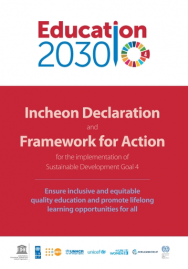About education
UNESCO believes that education is a human right for all throughout life and that access must be matched by quality. The Organization is the only United Nations agency with a mandate to cover all aspects of education. It has been entrusted to lead the Global Education 2030 Agenda through Sustainable Development Goal 4. The roadmap to achieve this is the Education 2030 Framework for Action (FFA).
UNESCO provides global and regional leadership in education, strengthens education systems worldwide and responds to contemporary global challenges through education with gender equality an underlying principle.
Its work encompasses educational development from pre-school to higher education and beyond. Themes include global citizenship and sustainable development, human rights and gender equality, health and HIV and AIDS, as well as technical and vocational skills development.
What we do
How we work
UNESCO leads the coordination and monitoring of the Global Education 2030 Agenda through Sustainable Development Goal 4 and using the Education 2030 Framework for Action as a roadmap.
The UNESCO Education Strategy 2014-2021 has three strategic objectives:

The education sector is shifting and evolving towards a more explicit, active commitment to addressing gender-related barriers within and beyond the education system. This shift is being accelerated by the COVID-19 pandemic with more NGOs, local governments as well as national governments recognizing the role education has in promoting gender-transformative change. Many are responding to this shift with innovations that aim to address the persistent challenges faced by girls and women in education. By highlighting these key practices through the Prize, we can contribute to inspiring more action for girls and women.
We speak about the importance of gender-transformative change both in and beyond education. Can you define what this means for you?
Gender-transformative education aims not only to respond to gender disparities within the education system but also to harness the full potential of education to transform attitudes, practices and discriminatory gender norms. Education can support critical changes for gender equality, such as promoting women’s leadership, preventing gender-based violence, and catalyzing boys' and men's engagement to embrace gender equality.
I have been very impressed by the capacity shown by many organizations and individuals nominated to adapt to the COVID-19 pandemic to ensure they could maintain the delivery of their programmes. We know that fewer girls and women have access to and use the internet, and the digital gender gap is growing, particularly in developing countries. Many found new ways of delivering educational content and finding solutions to conduct fully online or blended approaches to learning, often in low-resource settings where access to the internet is extremely limited.

I have been very impressed by the capacity shown by many organizations and individuals nominated to adapt to the COVID-19 pandemic to ensure they could maintain the delivery of their programmes. We know that fewer girls and women have access to and use the internet, and the digital gender gap is growing, particularly in developing countries. Many found new ways of delivering educational content and finding solutions to conduct fully online or blended approaches to learning, often in low-resource settings where access to the internet is extremely limited.


